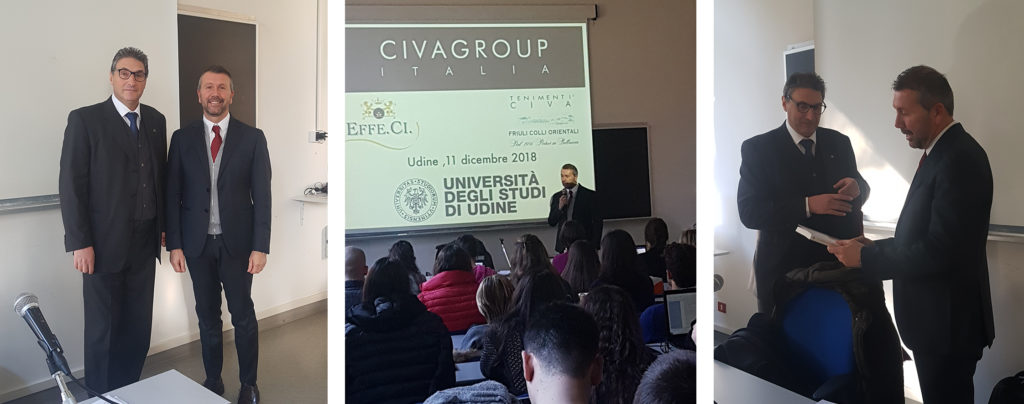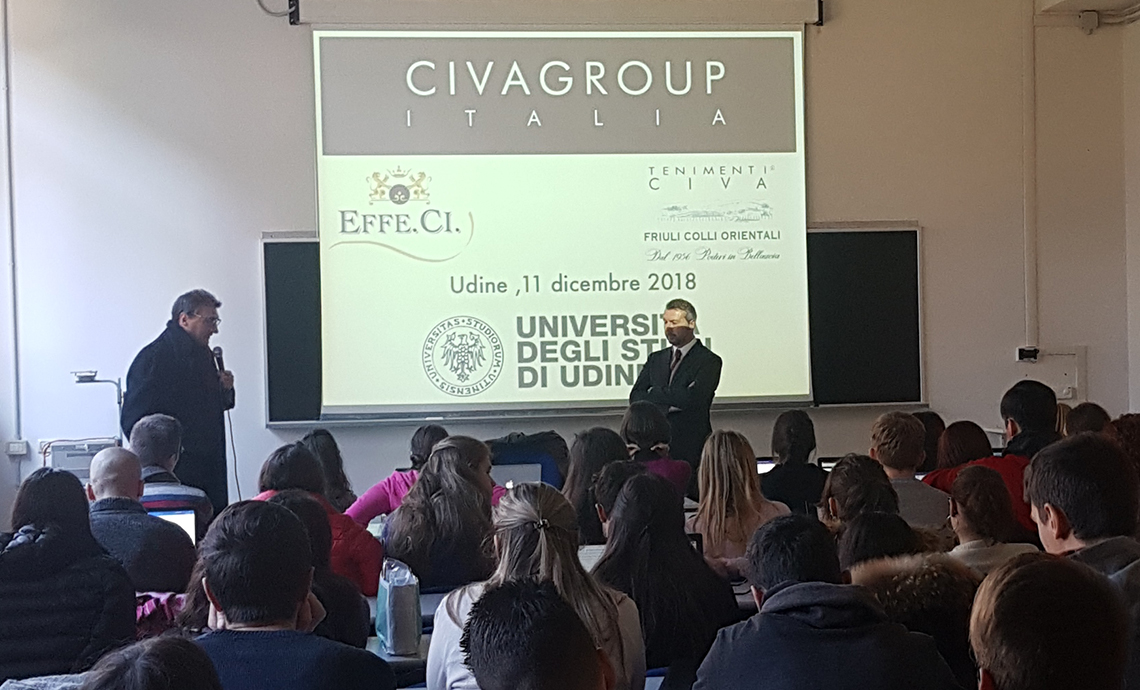CIVIL and SOCIAL RESPONSIBILITY and ONGOING TRAINING
Valerio Civa’s talk at the University of Udine
“Civil and social responsibility are values that you must never neglect in life. Whatever your business project turns out to be, don’t let the pursuit of profit alone prevail. We are all part of this society and as such we have a duty to contribute to its balanced development”.
These are the words with which Valerio Civa addressed, a few days ago, first and second year students of the degree course in Business Administration at the University of Udine, accepting the invitation of Professor Andrea Cafarelli to give a talk as part of his Business History course.
“Becoming an entrepreneur,” he said, “requires ongoing training. I have always devoted a lot of time to learning: from a degree in economics, to experience abroad, up to my recent commitment to obtaining qualification as an agricultural entrepreneur. A post-graduate internship in France allowed me to understand what was happening in the large-scale distribution sector. Based on that experience and thanks to an analysis of the Italian situation, it was clear that supermarkets could become the main players in the Italian market for the quality wine sector”.
Effeci, the company founded more than twenty-five years ago, implemented a business project of consultancy and product development for wineries and supermarkets.
Back then, the wine market was moving from unbottled wine to quality bottled products, sold exclusively to the hospitality industry. At the same time, supermarkets created dedicated display areas, since offering quality wines strengthened the positive perception of their image.
His interpretation of this new scenario led Valerio Civa to select quality wines to propose to supermarkets. His career as an entrepreneur began as a wholesaler, then as an exclusive distributor of some wineries for supermarkets, also creating dedicated labels, until he became a producer in 2016 with Tenimenti Civa, in the Colli Orientali del Friuli.
The Friulan producer, which has about 55 hectares of vineyards, had 20 when it started out, and is set to soon have 80. The winery was set up to carry out two important projects resulting from careful analysis and planning of the quantitative and qualitative goals to be achieved.
One project is dedicated to Ribolla Gialla, a native variety which has an important history in Friuli and which, like few others, lends itself to giving wines of different types: still, semi-sparkling and sparkling; the other is a Quality Agricultural Project aimed at supermarket retailers and baptized with the name of “High Quality in the Shopping Trolley”. The goal is to achieve production levels of 10 million bottles in 2025, while maintaining high quality standards.

“The future of wine,” stressed Valerio Civa, “brings some opportunities and strategies that need to be implemented:
• Every business decision must be made with respect for the environment and the final consumer, because farming means the use of chemical products (herbicides, pesticides …) which is in stark contrast to that ‘respect’. Environmental sustainability must therefore translate into an assessment of which products can be used and which cannot.
• Growing native varieties means not abandoning local traditions. In this project, we have involved small producers from the Colli Orientali del Friuli who bring us the fruit of their work. This is a joint growth process which results in increasing quality.
• All the steps in the production chain, from harvesting the grapes to obtaining the wine, must be traceable, so that we can respond to the consumer’s requests for knowledge and transparency. The cellar built in 2018 embodies the latest digital technology, and even using a simple smartphone we can monitor in detail the entire production process of the wine.
• Innovation is fundamental for competing on the markets. We welcome new technologies that help us meet the needs of consumers, but we are convinced that innovation must be implemented by listening to those who are the best custodians of tradition, that is, those who work the land and the vineyards.”
All the strategies implemented obviously require the organization of economic, financial and human resources.
“The latter,” commented Valerio Civa, “must be adequately trained and supported in their professional development.
In order to attract and manage talents we have to give them a dream, a path of growth in a united team. It is the responsibility of the entrepreneur-manager to prepare his company to remain standing even without his guidance.
Maria Cristina Pugnetti
Could it be interesting for you:
None found

